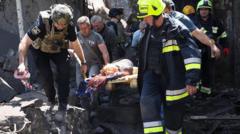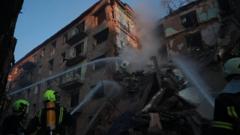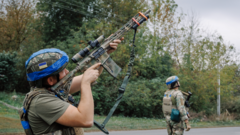In a park near Dubna, just east of Moscow, a historical re-enactment commemorates the Red Army's final battles against Nazi Germany. This spectacle, marked by the destruction of a swastika banner and the rise of the Soviet hammer and sickle, draws crowds and evokes personal histories linked to wartime sacrifice. For many, including Katya, who witnesses the event, these recollections are intertwined with the present, as her son currently fights in Ukraine, a conflict framed by the Kremlin as a continuation of the fight against fascism.
Russians Commemorate WW2 Victory Amid Ongoing Conflict in Ukraine

Russians Commemorate WW2 Victory Amid Ongoing Conflict in Ukraine
As the 80th anniversary of the Soviet victory in World War II approaches, Russians reflect on their past and present conflicts, blending historical remembrance with the ongoing war in Ukraine.
The Russian narrative emphasizes the Great Patriotic War's historical significance, presenting the current military operations in Ukraine as an extension of that struggle. State media shapes this ideal, reinforcing views of external betrayal and painting the nation as a resilient fortress against Western aggression. Monuments and events celebrating the victory over Nazism blend past struggles with present ambitions, showcasing both military prowess and a unifying national consciousness.
The upcoming Victory Day celebrations promise to be even more poignant this year, with significant international attendees expected amidst heightened security following drone threats in Moscow. As Russians prepare to commemorate their past sacrifices, they remember both the losses of World War II and the ongoing toll of conflict today, echoed in the somber reflections of veterans like Fyodor Melnikov, who lost family in the Great Patriotic War.
As the nation remembers its heroes, it also contemplates the enduring cost of war.
In Dubna, historical tributes evoke echoes of the past where Soviet soldiers fought fiercely against Nazi forces. A vibrant crowd is treated to an extensive re-enactment filled with explosions and intense battles, symbolizing the storied victories of the Red Army. Among the attendees is Katya, whose family legacy of service resonates deeply in today’s sociopolitical climate. Her grandfather fought valiantly in World War II, a battle that led to massive casualties among Soviet citizens.
Today’s conflict, however, marks a stark contrast with the use of historical narratives employed by the Kremlin to justify its invasion of Ukraine. With references to Euro-fascism and the Soviet victory framing current military actions, the narrative creates a blurred line between past and present struggles against perceived threats.
As the 80th anniversary of the Great Victory approaches, Russia ramps up patriotic displays, including public monuments that connect heroes of the past to current soldiers engaged in active conflict. Furthermore, the atmosphere leading up to Victory Day reflects a fear intertwined with fierce nationalism. Parades featuring military might, cultural installations, and emotional remembrances build an unshakeable connection between historical sacrifice and modern warfare, shaping national identity in today’s Russia.
The commemorative events will honor not just those who fell in the Great Patriotic War but also those currently impacted by the fighting in Ukraine, illustrating how intertwined the themes of loss and valor remain within the Russian consciousness.
The upcoming Victory Day celebrations promise to be even more poignant this year, with significant international attendees expected amidst heightened security following drone threats in Moscow. As Russians prepare to commemorate their past sacrifices, they remember both the losses of World War II and the ongoing toll of conflict today, echoed in the somber reflections of veterans like Fyodor Melnikov, who lost family in the Great Patriotic War.
As the nation remembers its heroes, it also contemplates the enduring cost of war.
In Dubna, historical tributes evoke echoes of the past where Soviet soldiers fought fiercely against Nazi forces. A vibrant crowd is treated to an extensive re-enactment filled with explosions and intense battles, symbolizing the storied victories of the Red Army. Among the attendees is Katya, whose family legacy of service resonates deeply in today’s sociopolitical climate. Her grandfather fought valiantly in World War II, a battle that led to massive casualties among Soviet citizens.
Today’s conflict, however, marks a stark contrast with the use of historical narratives employed by the Kremlin to justify its invasion of Ukraine. With references to Euro-fascism and the Soviet victory framing current military actions, the narrative creates a blurred line between past and present struggles against perceived threats.
As the 80th anniversary of the Great Victory approaches, Russia ramps up patriotic displays, including public monuments that connect heroes of the past to current soldiers engaged in active conflict. Furthermore, the atmosphere leading up to Victory Day reflects a fear intertwined with fierce nationalism. Parades featuring military might, cultural installations, and emotional remembrances build an unshakeable connection between historical sacrifice and modern warfare, shaping national identity in today’s Russia.
The commemorative events will honor not just those who fell in the Great Patriotic War but also those currently impacted by the fighting in Ukraine, illustrating how intertwined the themes of loss and valor remain within the Russian consciousness.




















